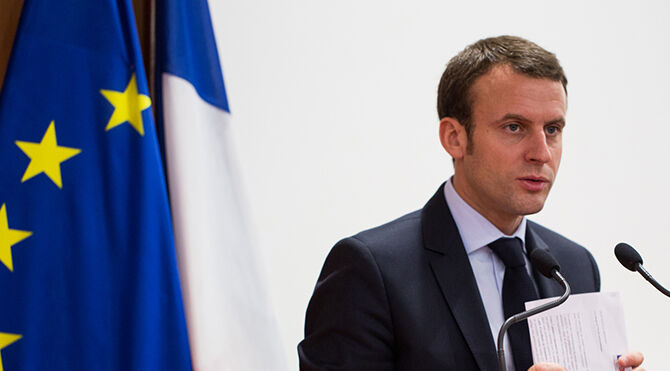Macron wins but economic and Brexit problems remain
A sigh of relief was heard in European Union capitals as Emmanuel Macron – leader of centrist party En Marche – won a convincing victory in the French presidential election over Marine Le Pen’s far right.

© École polytechnique - J.Barande
France's youngest president
Mr Macron, who, at the age of 39, will be inaugurated as France's youngest president on Sunday, is a centrist and an avowed pro-European, while his opponent had an anti-immigration policy, a plan to withdraw France from the eurozone, and had pledged to hold a referendum on the nation's membership of the EU.Immediately after his 66.1 per cent to 33.9 per cent victory over Ms Le Pen, Mr Macron vowed to fight “the forces of division that undermine France”, although how effective he can be will largely depend on how much support he can count on the national legislature after elections in a month's time.Choosing a European future
The almost palpable relief over the result within the EU was reflected in a tweet from European Commission chief Jean-Claude Juncker which said he was “happy that the French chose a European future”, and in comments from German Chancellor Angela Merkel, who described Mr Macron's win as a “victory for a strong united Europe”.Mr Macron is expected to play a pivotal role in Brexit negotiations and UK Prime Minister Theresa May was among the first to call him to congratulate him on his victory. Downing Street later emphasised that France remained one of Britain's closest allies and that Mrs May was looking forward to working with the new president “on a wide range of shared priorities”.UK wants a strong partnership
A spokesman added that the pair had discussed Brexit “briefly” during their phone call and that Mrs May “reiterated that the UK wants a strong partnership”.In an interview on Monday morning with BBC Radio 4's Today programme, Jean Pisani-Ferry, chief economic adviser to Mr Macron, said, “I don't think anybody has an interest in a hard Brexit. I think we need to build a new relationship. There are interests on both sides. There is a negotiation to be carried out.“There is a mutual interest in keeping prosperity that exists, that has been built over the years from lots of economic and various relationships, also the security and defence relationship is extremely important in the kind of environment we are in, which is a very dangerous environment.“So we have to keep all that, at the same time we have divergent interests on some aspects of the negotiation, so there will be a tough negotiation and he (Macron) will be tough.”Domestic challenges ahead
But there are domestic challenges ahead for Mr Macron and his party En Marche, which is barely a year old. While unemployment is not the highest in the EU, it remains at just over 10 per cent, more than twice the rate in either Germany or the UK.During the campaign, Mr Macron pledged to make budget savings of €60 billion in a bid to keep France within the EU deficit limit of three per cent of GD, and said he would make state investments of €50 billion over five years for environmental measures, apprenticeships, digital innovation and public infrastructure. He has also said he wants to reduce France's corporation tax rate from 33.3 per cent to 25 per cent.Related news:
- Goldman Sachs eyes possible post-Brexit relocation
- The Brexit dividend – a boost for global cities?
- United Kingdom – Brexit and the consequences for UK immigration
Katya Adler, BBC Europe editor, commented, “Emmanuel Macron has won the presidency. He now needs to win over the French people.Many of those who voted for him did so to stop Marine Le Pen. They remain to be convinced by his political programme – unlike Brussels, which is delighted.“EU leaders believe Marine Le Pen's defeat is a strong sign that Eurosceptic nationalism is now ebbing. But while far-right populists have been defeated in Austria, the Netherlands and France, the barbed issues that drove voters to them – unemployment, immigration and fear of globalisation – remain to be resolved.“France's deep political divisions will become evident once again in the lead-up to parliamentary elections. The question remains: will Emmanuel Macron, inexperienced in politics and with his fledgling party be able to form the credible government needed to pass the reforms he promises?”For related news and features, visit our Brexit section.Access hundreds of global services and suppliers in our Online Directory
 Get access to our free Global Mobility Toolkit
Get access to our free Global Mobility Toolkit 
©2024 Re:locate magazine, published by Profile Locations, Spray Hill, Hastings Road, Lamberhurst, Kent TN3 8JB. All rights reserved. This publication (or any part thereof) may not be reproduced in any form without the prior written permission of Profile Locations. Profile Locations accepts no liability for the accuracy of the contents or any opinions expressed herein.




























